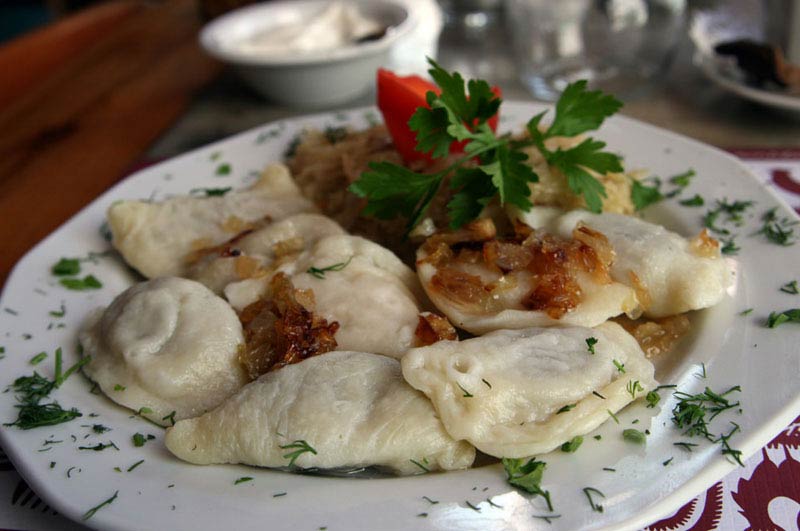Where exactly the first pierogis were created is in the midst of a debate. Some say that they reached the area introduced when Marco Polo brought it back from his journey. Others believe that Saint Hyacinth of Poland introduced pierogis. Hyacinth in 1238 visited Russia when a storm hit and destroyed all crops. Hyacinth fed the crowds pierogis. No matter what story is true as none can be proved, the truth is that this dish has been part of the food eaten in this area for many years
In Poland pierogis are considered peasant food, though all classes enjoy the dish. In the 17th century the pierogi was considered a staple of the Polish diet. Each holiday has a special pierogi with different shapes and fillings. Weddings, mournings and other special times each had a special pierogi as well. A special festival in Poland head on the day of St. Hyacinth celebrates pierogies as well.
In the Ukraine pierogi is known as varenyky and are served during the daily meal as well as on traditional celebration days. Varenyky are filled with sour cherries and served as a desert as well. Pierogies appear as baked pies and buns rather than dumplings in this area. Fillings of these buns and pies often include cottage cheese, potato, boiled beans, mushy peas, sauerkraut, fruits, potato and cheese, cabbage, meat, fish and buckwheat.
Immigrant families would serve the dish to feed their families but as the popularity grew pierogi would be served more and more in restaurants. Large churches during the World War II era would host fundraiser dinners where pierogi would be served. By the 1960s pierogi could be found in the supermarket frozen food aisles. Today, the pierogi is found in a wide variety of flavors in the grocery store. Fillings have changed a bit but the dish is still more or less the same.
In the United States pierogi are growing in popularity. Food trucks designed to sell pierogi can be seen in San Diego Other restaurants in large cites are selling gourmet pierogi flavors.
Interested in tryin a Pierogi head to the local grocery store and most likely find them in the frozen food aisle or check out this recipe
3-1/2 cups all-purpose flour, plus more for dusting
3 large eggs
2 tablespoons sour cream
¾ cup water
Filling
2 cups mashed potatoes
½ teaspoon garlic powder
½ teaspoon onion powder
½ teaspoon salt
¼ teaspoon black pepper
1 cup grated cheddar cheese
For Serving
½ cup butter
¼ cup sour cream
minced chives
In a large mixing bowl making the dough by combining flour, eggs, sour cream and water. Slowly beat in the eggs until dough is well combined. Turn the dough out onto a clean, lightly floured surface. Knead 3 to 5 minutes. Wrap in plastic wrap and rest 30 minutes.
In another large mixing bowl, stir together mashed potatoes, garlic powder, onion powder, salt, pepper, and cheese.
Bring a large pot of salted water to a boil. Meanwhile, pinch of tablespoon sized pieces of dough and roll into about three dozen balls. Roll each ball out on a lightly floured surface into a 3½ to 5 inch circle. Cover with a damp towel or paper towel to prevent them from drying out.
Place a heaping tablespoon of potato filling into the center of each circle. Fold in half, pinching the sides shut with your fingers, or gently with a fork to seal. Working in small batches, boil in salted water 2 to 3 minutes, until they float. Remove and transfer to a paper towel lined plate to drain.
Melt ½ cup butter in a large skillet and saute pierogi until lightly browned. Serve hot topped with sour cream and garnish with chives.
recipe source here
shared this food post at these blog hops
beautifully made


No comments:
Post a Comment
I love comments so if you have a minute leave me your thoughts on the above post